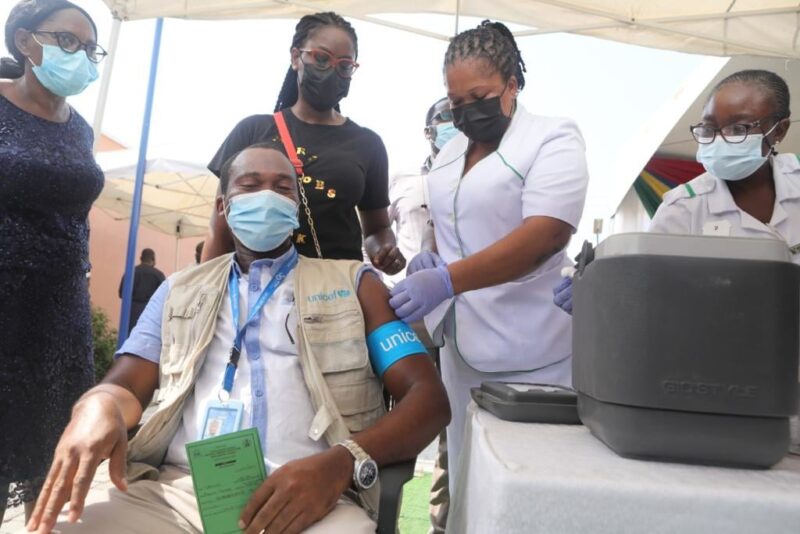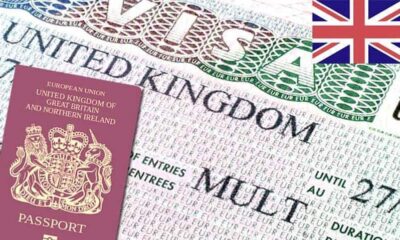COVID-19
UK closes all travel corridors for four weeks from Monday

The United Kingdom is to close all travel corridors for four weeks from Monday morning to protect against the risk of unidentified new strains of COVID, the Prime Minister, Boris Johnson, has said.
Anyone flying into the country from overseas will have to show proof of a negative COVID test before setting off, according to the new directive.
It comes as a ban on travellers from South America and Portugal came into force on Friday over concerns about a new variant identified in Brazil.
Johnson said the new rules would be in place until at least 15 February.
A further 1,280 people with coronavirus have died in the UK within 28 days of a positive test, taking the total to 87,291.
The latest government figures on Friday also showed another 55,761 new cases had been reported – up from 48,682 the previous day.
More than two million people around the world have now died with the virus since the pandemic began, according to figures from Johns Hopkins University.
Speaking at a Downing Street press conference, the prime minister said it was “vital” to take extra measures now “when day by day we are making such strides in protecting the population”.
“It’s precisely because we have the hope of that vaccine and the risk of new strains coming from overseas that we must take additional steps now to stop those strains from entering the country.”
All travel corridors will close from 04:00 GMT on Monday. After that, arrivals to the UK will need to quarantine for up to 10 days, unless they test negative after five days.
Johnson, who said the rules would apply across the UK after talks with the devolved administrations, added that the government would be stepping up enforcement at the border and in the country.
Travel corridors were introduced in the summer to allow people travelling from some countries with low numbers of COVID cases to come to the UK without having to quarantine on arrival.
Trade body Airlines UK said it supported the latest restrictions “on the assumption” that the government would remove them “when it is safe to do so”.
Chief executive Tim Alderslade said travel corridors were “a lifeline for the industry” last summer but “things change and there’s no doubting this is a serious health emergency”.
Labour leader Sir Keir Starmer said it was the “right step” but called the timing of the decision “slow again”, adding that the public would be thinking “why on earth didn’t this happen before”.
The prime minister warned that the NHS was facing “extraordinary pressures”, having had the highest number of hospital admissions on a single day of the pandemic earlier this week.
He said that came on Tuesday when there were 4,134 new admissions, while the UK currently has more than 37,000 Covid patients in hospitals.
Johnson said that once the most vulnerable have been vaccinated by mid-February “we will think about what steps we could take to lift the restrictions”.
England is currently under a national lockdown, meaning people must stay at home and can go out only for limited reasons such as food shopping, exercise, or work if they cannot do so from home.
Similar measures are in place across much of Scotland, Wales and Northern Ireland.
-BBC
COVID-19
China records nearly 13,000 COVID deaths in a week

China reported nearly 13,000 Covid-related deaths in hospitals between January 13 and 19, after a top health official said the vast majority of the population had already been infected.
The death toll came a week after China said nearly 60,000 people had died with Covid in hospitals in just over a month – but there has been widespread scepticism over official data since Beijing abruptly axed anti-virus controls last month.
China’s Center for Disease Control and Prevention (CDC) said in a statement on Saturday that 681 hospitalised patients had died of respiratory failure caused by coronavirus infection, and 11,977 had died of other diseases combined with infection over the period.
The figures do not include anyone who died at home.
Airfinity, an independent forecasting firm, has estimated daily Covid deaths in China will peak at about 36,000 over the Lunar New Year holiday.
READ ALSO:
- Two trapped to death while working in soakaway pit at Sabon Gari market in Kano
- Buhari killed innocent herdsmen than Jonathan, Obasanjo, others – Gumi
- At last, Rivers PDP dumps Atiku for Tinubu
The firm also estimated that more than 600,000 people have died from the disease since China abandoned the zero-Covid policy in December.
China has passed the peak period of Covid patients in fever clinics, emergency rooms and with critical conditions, Guo Yanhong, an official from the National Health Commission told a news conference on Thursday.
‘No second wave’
Tens of millions of people have travelled across the country in recent days for long-awaited reunions with families to mark Sunday’s Lunar New Year, raising fears of fresh outbreaks.
China’s transport authorities have predicted that more than two billion trips will be made this month into February, in one of the world’s largest mass movements of people.
President Xi Jinping Wednesday expressed concerns over the spread of the virus in rural China, much of which lacks medical resources.
But a top health official said China would not experience a second wave of infections in the months after the festive migration, because nearly 80 per cent of the population had already been infected by the virus.
“Although a large number of people travelling during the Spring Festival may promote the spread of the epidemic to a certain extent… the current wave of epidemic has already infected about 80 per cent of the people in the country,” Wu Zunyou, chief epidemiologist at the CDC, said in a post on China’s Twitter-like Weibo platform on Saturday.
“In the short term, for example, in the next two to three months, the possibility of… a second wave of the epidemic across the country is very small.”
Residents in central China’s Wuhan, where the first coronavirus infections were reported in late 2019, celebrated the arrival of the Year of the Rabbit on Saturday night with fireworks, flowers and offerings to loved ones they lost to the virus.
COVID-19
Nigeria records 42 fresh cases of COVID-19 in 14 days

Fresh 42 COVID-19 cases have been recorded in Nigeria in two weeks, with Lagos State topping with 27 cases, the Nigeria Centre for Disease Control and Prevention (NCDC) has said.
The NCDC made this known via its official website on Sunday, adding that Edo, Kano, Nasarawa, Kaduna, Plateau and the Federal Capital Territory contributed the remaining cases.
This is coming amid resurgence of the new variant of the disease from China where the authorities said nearly 60,000 people with COVID-19 had died in hospitals in about a month.
The NCDC said that the new cases brought Nigeria’s total of COVID-19 infections to 266,492 and that the fresh cases were recorded between December 31, 2022 and January 13, 2023.
”From December 31 to January 6, 13 new confirmed cases have been recorded in Nigeria. The 13 new cases are reported from two states – Lagos (12) and Edo (one),” it said.
It confirmed that the country recorded 29 new cases from January 7 to 13; and the new cases are reported from, Lagos (15), FCT (five), Kano (four), Nasarawa (three), Kaduna (one) and Plateau (one).
It also said that a multi-sectoral national Emergency Operations Centre activated at Level 2, had continued to cordinate the national response activities.
Meanwhile, the country registered 266,492 COVID-19 confirmed cases, 3,155 deaths, and 259,858 cases had been discharged across 36 states including the FCT.
The National Primary Health Care Development Agency (NPHCDA) said, “If you are yet to be vaccinated, visit the nearest vaccination site to receive your Johnson and Johnson single-dose vaccine. All COVID-19 vaccines are free, safe and effective.”
COVID-19
Panic spreads as China records 60,000 fresh COVID deaths in 34 days

China says almost 60,000 deaths linked to COVID-19 were recorded between December 08, 2022 and January 12, 2023 in the country.
A major wave of the virus surfaced in China after President Xi Jinping abruptly lifted zero-Covid policy restrictions last month, UK Guardian reports on Saturday.
A report from Peking University said 900 million Chinese people are already infected with the virus.
It also said some major cities had experienced infection rates of between 70% and 90% of their populations since then.
The surge in infections has been attributed to the Chinese government’s emphasis on shielding the 1.4 billion people that make up its population rather than inoculating them effectively against the Covid-19 virus.
However, authorities have announced the fatalities resulting from the wave was 59,938.
The head of the Bureau of Medical Administration, Jiao Yahui, on Saturday announced there had in fact been 59,938 Covid deaths between December 8 and January 12.
This figure included about 5,500 individuals who died of respiratory failure, while the rest also had underlying health conditions. The average age of those who died was 80, Jiao said, with 90.1% aged 65 and above.
The holidays in China officially start January 21 and involve the world’s largest annual migration of people.
Some two billion trips are expected to be made and tens of millions of people have started to travel – although they have been urged not to visit their elderly relatives, in order to prevent them from becoming infected.
Jiao claimed case rates were declining and the peak had passed in most areas. She said the daily number of people going to fever clinics peaked at 2.9 million on 23 December and had fallen by 83% to 477,000 on Thursday.
“These data show the national emergency peak has passed,” she said.
-

 Politics3 days ago
Politics3 days agoGbajabiamila speaks on his rumoured Lagos governorship ambition
-

 metro3 days ago
metro3 days agoFarotimi to pursue disbarment over arrest, defamation allegations
-

 Business2 days ago
Business2 days agoReal reason Dangote, NNPC drop petrol price — IPMAN
-

 Health2 days ago
Health2 days agoABU Teaching Hospital will begin kidney transplant in 2025 – CMD
-

 Sports1 day ago
Sports1 day agoAnthony Joshua prostrates before Governor Abiodun during Ogun visit
-

 metro3 days ago
metro3 days agoEl-Rufai accuses Tinubu govt of Yoruba agenda, Reno Omokri reacts
-

 metro3 days ago
metro3 days agoNigerian govt urged to intervene in Mozambique post-election violence
-

 metro3 days ago
metro3 days agoAdeleke presents staff of office to new Owa-Obokun amid protest














You must be logged in to post a comment Login